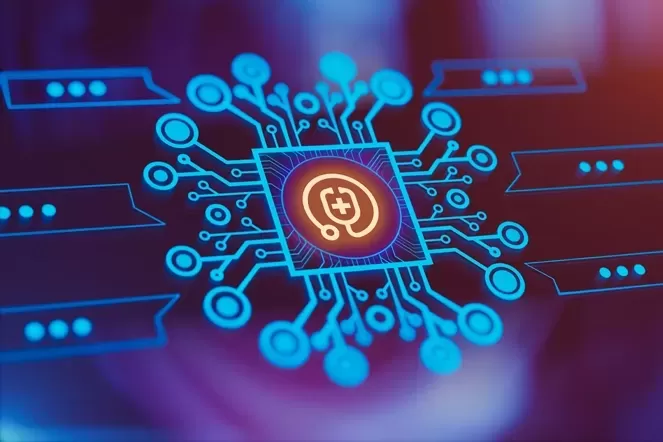Is the AI doctor in?
Posted on December 10, 2023
AI is changing entire industries, for better or for worse. But one field in which the advancements of AI are undoubtedly positive is that of speech recognition software.
The practical uses for speech recognition software are increasing far beyond mere novelty, to the point where there are entire platforms designed for specific industries, like the legal sector and policing.
As artificial intelligence improves, so does speech recognition software. And for the healthcare sector, this tech is expected to change the game entirely.
In today’s blog, we’ll be looking more closely at how AI and speech recognition go hand in hand, the future of this tech in the healthcare sector, and the potential future benefits of speech recognition software for healthcare.
The sophistication of AI in speech recognition software
The capabilities of speech recognition are growing every year, and that’s largely down to AI. When you give a voice command to a platform using speech recognition, your words will be instantaneously broken down into components that the software can understand, and transcribe. The more sophisticated platforms can even be trained on individual voices and speech patterns, allowing the accuracy to improve over time.
The future of AI and speech recognition software in the healthcare sector
The continued integration of AI with speech recognition tech holds a great deal of promise for the future of healthcare, making things more convenient for both healthcare professionals and patients. As the synergy increases between these technologies, a whole range of medical processes could be streamlined.
One example lies within the consultation process. There are already speech recognition platforms designed specifically for the healthcare sector; Nuance’s Dragon Medical One (DMO) uses advanced AI and deep learning algorithms to accurately transcribe the most niche medical jargon.
This means that an entire conversation between a healthcare professional and their patient can be recorded and transcribed, with minimal errors. And as artificial intelligence gets more and more sophisticated, algorithms will be able to sift through this data to extract key points, capture patient information, and to recommend treatments.
Increased accuracy
AI will also be able to analyse this data in real time, identifying patterns and automatically correlating symptoms with potential diagnoses. It can often be a struggle for healthcare professionals to arrive at specific diagnoses, and having the support of machine learning algorithms could prove invaluable, not least in reducing medical errors.
It’s not just arriving at diagnoses that can be supported by speech recognition software. With accurately transcribed documentation throughout the patient journey, there would be very little risk of omissions or discrepancies. And while healthcare professionals already maintain medical histories as a point of practice, a backlog of automated transcriptions would provide a more comprehensive overview of those histories.
Say, at a previous appointment, a patient had brought up a symptom that had no reason to cause concern at the time it was recorded. Then at a later appointment, the patient describes new symptoms. The healthcare professional (the patient’s doctor, in this case) could use AI to instantly sift through the transcripts of previous consultations. Using this broader view of the patient’s symptom history may make it easier for the doctor to arrive at potential diagnoses.
Ideally, machine learning algorithms would be able to paint a clearer picture of a patient’s medical history than medical professionals ever could.
Conclusion: is the AI doctor in?
Speech recognition software has already changed the game for the healthcare sector. Paired with the growing sophistication of AI, healthcare professionals could be facing a new era of precision, and effiency, when it comes to patient care. And as these advancements are set to continue, healthcare could ultimately be improved in ways we currently can’t even fathom.
Want to find out more about speech recognition software? Check out our complete guide to Dragon Medical One.
We help organisations reduce the time and cost of producing correspondence via information workflow apps, speech recognition software, and digital dictation hardware & software. If you think we could help your business,book a consultation today.


